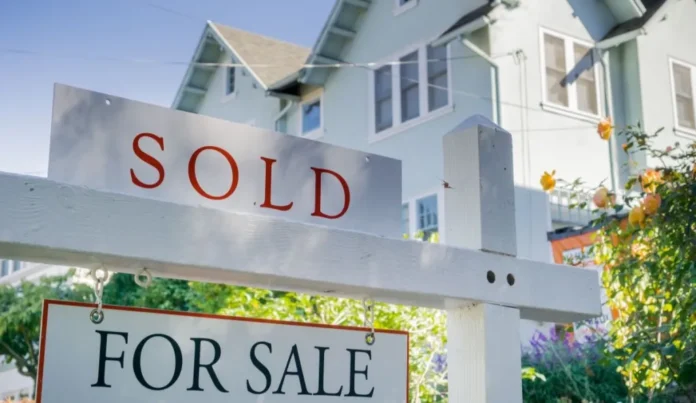By Agencies
U.S. existing home sales fell to a nine-month low in June as rising mortgage rates and economic uncertainty kept many potential buyers at bay, signaling a worsening slump in the housing market.
A report from the National Association of Realtors (NAR) on Wednesday highlighted weak single-family homebuilding last month, indicating that residential investment—including home sales and broker commissions—likely continued to hinder economic growth in the second quarter.
The housing market is particularly sensitive to interest rates. Although it makes up less than 5% of gross domestic product (GDP), its impact extends through related purchases like furniture and appliances. Concerns are growing that a prolonged downturn could affect the larger economy.
“The housing market closed a lackluster first half of 2025 on a low note, with high mortgage rates and soft labor market conditions impacting demand,” said Ben Ayers, a senior economist at Nationwide. “We expect sales activity to remain weak throughout the summer and into the fall as many renters opt to wait for lower rates and a more stable economy.”
Home sales dropped 2.7% last month to a seasonally adjusted annual rate of 3.93 million units, the lowest since September 2024, according to the NAR. Economists surveyed by Reuters had anticipated resales would decline to a rate of 4.00 million units. Year-over-year sales were unchanged in June.
Sales decreased in the Northeast, Midwest, and the densely populated South, though they rose in the West. Government data released last week showed single-family homebuilding fell to an 11-month low in June, while permits for future construction hit a more than two-year low.
A Reuters survey indicates that data due Thursday may show a slight uptick in new home sales for June. The average rate for the popular 30-year fixed mortgage has remained just below 7% this year, following the Federal Reserve’s pause on interest rate cuts amid inflation concerns linked to President Trump’s protectionist trade policies.
Trump criticized Fed Chair Jerome Powell on Tuesday for maintaining high rates, suggesting it is hindering home purchases. He stated, “People aren’t able to buy a house because this guy is a numbskull.”
The Fed is expected to keep its benchmark overnight interest rate between 4.25% and 4.50% after its upcoming policy meeting. The central bank cut rates three times in 2024, with the last adjustment in December.
“The Fed will not rush to save the housing market, which is just one part of the economy,” said Carl Weinberg, chief economist at High Frequency Economics. Trump has also proposed eliminating capital gains tax on home sales to bolster the housing market.
Weak Buyer Demand
Weak sales, particularly in the Washington, D.C. metro area—hit hard by the Trump administration’s spending cuts and federal job losses—have increased housing supply. This trend has slowed house price growth, potentially impacting consumer spending.
In June, the inventory of existing homes rose 15.9% to 1.53 million units compared to a year earlier. At the current sales rate, it would take 4.7 months to deplete existing inventory, up from 4.0 months a year ago. A balanced market is generally seen as having a four-to-seven-month supply, but current conditions reflect a mix of low inventory and sales activity.
While national supply remains below the 1.8 million-1.9 million units seen before the COVID-19 pandemic, several regions—including Washington, D.C., Idaho, Nebraska, Texas, and Florida—have experienced significant inventory increases. However, some markets, like New York, still face shortages.
“Decreased demand for labor has made job hunting tougher, likely leading to weaker buyer demand and more forced sales,” said Charlie Dougherty, a senior economist at Wells Fargo.
The median existing home price rose 2% last month from a year earlier, reaching a record high of $435,300. According to Redfin data, national house prices increased 3.4% year-over-year in June, the smallest gain in two years. Washington, D.C. saw a more modest increase of 2.9%, down from 10.9% in March.
Thirty of the 50 metro areas recorded a month-over-month decline in home prices in June, with annual prices dropping in Tampa, Austin, and Dallas. The NAR report noted that properties typically spent 27 days on the market last month, compared to 22 days a year ago.
First-time buyers accounted for 30% of sales, up from 29% last year, although economists suggest a 40% share is necessary for a strong housing market. All-cash transactions made up 29% of sales, up from 28% the previous year.
Despite challenges in certain areas, forced sales remain low. Distressed sales, including foreclosures, constituted 3% of transactions, up from 2% a year ago. During the Great Recession from 2007 to 2009, such sales made up 30% to 40% of transactions.
“We anticipate sales will remain stable for the rest of 2025 before rebounding in 2026 as the Fed begins significant rate cuts,” said Nancy Vanden Houten, lead economist at Oxford Economics.

